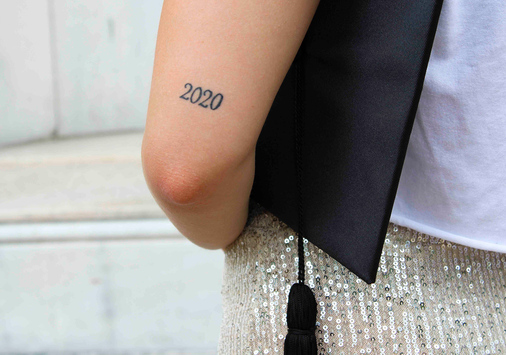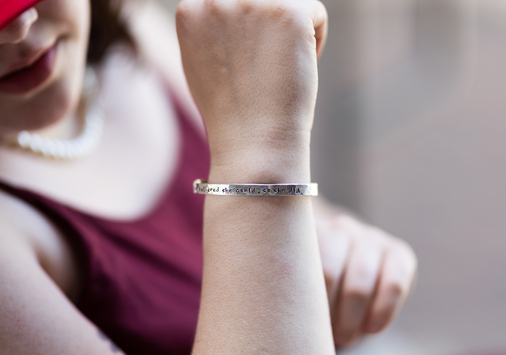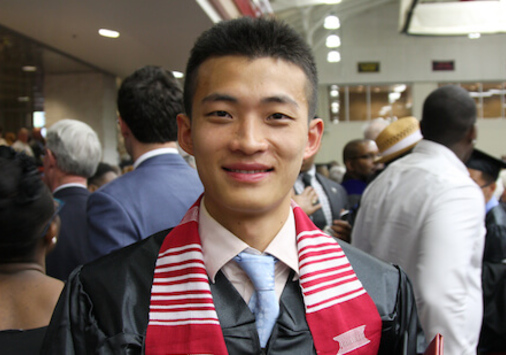Each year, students compete for the honor of being chosen as the student keynote speaker at Commencement. Each submission is excellent and choosing a winner is difficult. We share submitted keynotes from three students here. They indicate the breadth of experiences a Denison education encompasses.
Be Brave, Not Perfect
I am honored to be here today to present and celebrate the Class of 2022! My name is Sydney Kistler, I am a Global Commerce major and Bluegrass Music minor from San Francisco. Three years ago on this campus, almost to the day, the Midwest tried to kill me.
I come from San Francisco, a place without tornadoes or many cows. The summer after freshman year, I stayed on campus to work in the admissions office and one night I awoke to tornado sirens, harsh winds, thunder, and lightning that cut the power, leaving only the glow of red exit signs. As the last person residing in Curtis East, I remember freaking out in a ball under the table of the basement laundry room as I thanked my parents over the phone for the wonderful life they’d given me.
The next day, I crossed paths with President Weinberg. As he asked about my freshman year, I couldn’t help but tell him how shaken up I was from the violent storm the night before. Being from San Francisco, I didn’t realize this happens all the time and usually wasn’t a big deal. He laughed as he explained to me, “As long as we’re on The Hill and you don’t see flying cows, you should be okay.”
He was right, Denison is a place that teaches us to be brave.
The great Robert Frost once said: “Freedom lies in being bold.” When you are your boldest, you push through your fears and give yourself the freedom to be your most authentic and amazing self.
The inspiring Reshma Saujani, CEO of Girls Who Code, rocked my world with her book, Brave, Not Perfect. She referenced an HP study that stated, “men will apply for a job if they meet 60 percent of the qualifications, but women will apply only if they meet 100 percent of the qualifications.” It was then I realized society conditions some of us to be brave, and others to be perfect. By waiting until I felt fully prepared, I was shutting out a world of possibilities. Saujani’s message spoke to me as a woman, but being brave, not perfect, means something different to everyone.
- You, fellow Denisonians, have shown me how to be brave, not perfect, in so many different ways.
- You came out to your family while at Denison. And your friends went out of their way to support you.
- You won your first-ever NCAC championship. Denison’s women’s volleyball team has been the underdog for years, but you never stopped showing up and giving it your all.
- You launched a business during a pandemic, importing coffee from your father’s home country, Vietnam, that is now proudly served in Slayter.
- You gave your first formal theater performance in your last semester of senior year showcasing your original work, alongside other talented voices of color in the production of “HERE US.”
Most importantly, you showed up — every day.
We all showed up. And by showing up, we were able to learn from brilliant professors, who shared their experiences of boldly overcoming obstacles. And from President Weinberg, who set a tone of mutual respect and bravery: across administration, faculty, and the entire student body. Thank you all for leading by example, continuously inspiring us, and ultimately creating a ripple of bravery across the Denison community.
In our many stories, we may not have had all the answers — nor met 100% of the qualifications — but if we’d focused on being perfect, we may never have been brave enough to try.
What we had was passion. Our Denison experience and the relationships we’ve built with faculty, staff, and peers have taught us how to be brave enough to navigate the unfamiliar and uncomfortable. Won’t it be awesome when we come back for our 20th reunion and find that our brave, not perfect, choices led to us being some of the world’s greatest agents for change?
As kids and teens, society told us to fit in. We came to Denison and learned to stand out — in preparation for launch. Looking back on my conversation with President Weinberg, our approach to the pandemic and the last four years has meant being brave even amid cows flying. As we enter a world that demands innovation and craves change more than ever, our ability to bravely move amongst flying cows is what differentiates Denisonians, and what the leaders of our world need. So, dare to be brave, even when you’re not ready. Be brave, not perfect. And Rock n Roll Denny!
President Weinberg, Denison faculty, staff, alumni, guests, and most importantly, fellow Classmates:
LIFE.
Yes, LIFE has brought us together today to celebrate our graduation as the Denison University class of 2022. We have spent the past 4 years sharing life here at Denison, and although our experiences on this beautiful campus have been as diverse as the people in our class, we will forever share a common bond: our time spent together here, our college life on the Hill.
In her new book titled Call Us What We Carry, poet Amanda Gorman includes a short poem about life that I think is perfect for this day. She writes:
Life is not what is promised, But what is sought.
These bones, not what is found, But what we’ve fought.
Our truth, not what we said, But what we thought.
Our lesson, all we have taken & all we have brought.
I’ve read this poem over and over, and in doing so, I’ve gained an even greater appreciation for my life here at Denison. Take the first two lines: “Life is not what is promised, But what is sought.” Our life at Denison was not something that was promised to us. With the opportunity to be a student here, our college life became shaped by everything we sought. We sought to deepen our understanding of our passions and to expand our knowledge beyond our comfort zones. We sought to improve our abilities in academics, sports, and the arts. We sought to grow as people and learn about others’ diverse life experiences and perspectives. We sought to find truths and answers to the complex and the difficult, and sought to become better discerning moral agents. Our lives have been shaped by what we have sought and how we have sought it.
Now look at the second two lines: “These bones, not what is found, But what we’ve fought.” Throughout our life at Denison, we’ve had to fight through many difficult obstacles and challenges. We fought for a normal college life during a global pandemic. We fought to beat our rivals in athletic competitions. We fought to have our voices heard as we expressed our beliefs and rights, and in doing so, we became more active citizens of a democratic society. And although many obstacles were quite challenging, we fought together as one community to speak up, make change, and rise above. What and how we have fought has shaped and strengthened us.
The next two lines are as follows: “Our truth, not what we said, But what we thought.” At Denison, we’ve been challenged to expand the ways in which we think. We’ve learned how to think creatively, analytically, rationally, and innovatively in all aspects of our lives. This expansion of our thinking has allowed us to gain valuable insights, realize truths, and become better autonomous thinkers. What and how we have thought has shaped our true selves.
And finally, let’s look at the last two lines: “Our lesson, all we have taken & all we have brought.” At Denison, we’ve learned from incredible people including professors, peers, coaches, and teammates. But also, each one of us has brought unique talents, experiences, ideas, and perspectives to this campus. The real lesson we have gained is the understanding that true learning is a combination of what we are given as well as what we bring to each situation.
I came to Denison with a plan in mind of how my college years would play out, but life took me on its own journey. I had so many doors open for me here that I never expected, which actually changed my life for the better. The HESS department encouraged me to pursue my passion by seeking greater knowledge of how the human body works. This led to exciting research opportunities with Dr. Arnold and Dr. Martinez, and ultimately allowed me to achieve my dream of pursuing my doctorate in physical therapy at The Ohio State University.
After my freshman year when health issues required me to retire from swimming, the sport I have loved all my life, I learned more about myself, rediscovered my love of dancing, and found my amazing IDM hip-hop family. Though I am math and science-minded, my advisor, Mark Moller, helped me see that philosophical thinking actually helps me better approach my studies and my future profession.
My professors, advisor, and mentors all encouraged me to not be afraid to disagree with others and have impactful discussions. These types of discussions, which I frequently had with Dr. Winters, Dr. Conrad, and others are how I discovered that true learning is all about what we are given as well as what we bring. I love how one question to any one of my professors could turn into a wonderful 45-minute conversation. I will always cherish my 4 years of life here on the Hill. Although my college life was different from what I expected, my life at Denison was even more fulfilling than I could have imagined.
Amanda Gorman’s poem perfectly describes life. But it doesn’t only pertain to our college life; it is exactly how we will live the rest of our lives. After today, life will take us in many different directions. And while our new life experiences will again be as diverse as the people we are, we will continue to seek, to fight, to think, and to learn in the best way….for we are, and will always be, Denisonians!
I want to start this next chapter of our lives on an honest note. Considering how much time we devote to “fitting in” or being someone else, promise me hereafter you will try to lead your most honest and authentic lives. I know the cliché surrounding promises is that they are meant to be broken, but fingers crossed we don’t break this one. Somehow, we are expected to be perfect even amid a pandemic when we are seeing an increase in mental health conditions, extreme racial injustice, and laws that argue how you identify and who you love should be illegal.
One of the saddest things is that we believe in our hearts that there is something wrong with us—that there is a better, more perfect version of ourselves out there; a smarter, kinder, Whiter, straighter, and more fit, perfect version of ourselves. Today, I am here to tell you that there isn’t.
All of you as you sit here now, sweating through your graduation gowns and nervously anticipating what is to come, are enough. Say to yourself: “I am enough.” Whether or not you look like the person sitting next to you or have no idea what you want to do with your life after college—you are enough. We are enough. Not only are we enough, but also, we have so much to be proud of. We have grown a lot these past four years.
Growth is imminent and at times painful. It is also a crucial element in understanding ourselves and those around us. Denison fosters growth. We arrive on campus unsure of who we are, wondering if the goals and expectations we originally set for ourselves will be met or held. Regardless of past experiences, we all carry a weight on our shoulders.
Each year and with each new circumstance we learn to shake off some of that weight. We hold some in our hands and put a little in our pockets, distributing the weight instead of relying on our shoulders to carry the full burden. We exchange words and hugs with people who touch our hearts, and this too lightens the weight. At times the weight may feel so unbearable you feel as if you may collapse, but you push on.
You later look back on those arduous times and breathe a sigh of relief, thanking yourself for not giving up or giving in; for being kind to yourself and moving forward. Some of that weight disappears and there are aspects of that weight that stay with you forever—but that’s okay. Without this weight—the adopting or the shedding of it—we would not grow or make room for more experiences and life lessons.
At Denison, there has always been room to find what works for you. With the support of friends, faculty, and, of course, family, Denisonians are set on a course of finding themselves while also learning to better empathize with those who may at first seem different. We realize that we are more alike than not alike, that the norm is overrated, and that we should defy it in every way possible.
We all want the same things: love, affection, confidence, passion, respect, laughter, freedom, balance. Happiness. Oh, if it was so easy; but we try. The trying is key—and in that trying, we find that happiness is more than just a nine-letter word printed on the front of an overpriced sweatshirt. It involves bravery and trust and patience. It’s throwing yourself into the unknown—college, study abroad, love, your first real job—and hoping that the process opens your eyes and teaches you more about yourself and others.
Sometimes your journey towards happiness doesn’t go as planned, but those setbacks lead to another kind of happiness, and when your own unique happiness clicks and starts to make sense it feels like fireworks going off in your head. I know that sounded like a lot, but that’s life. It will be a lot, it will be hard, but it will all be worth it.
Looking back four months ago as I started my last semester of senior year, struggling to adjust to being back on campus after studying abroad and wanting to write this speech, I am proud of who I was even then. I’d like to think you would be proud of who you were and who you are, too. You should be.
Something struck a nerve for me that second week back on campus. I was sitting in class one day when I saw this quote etched on the blackboard:
“‘Why bother?’ Because right now there is someone out there with a wound in the exact shape of your words.”
What I took from this rather conveniently placed anecdote was that when you feel like giving up or that your words don’t matter, there will always be someone who could use your support, affection, or just a nice chat. And at times if you feel like your own words cannot heal your wounds, just know they can for someone else and take that as a sign that you are enough.
I later looked up the quote to see what the heck Sean T. Dougherty was really trying to say. He wrote poetry, so it is likely Dougherty wanted his readers to make their own sense of it all. His book of poems (where this quote originates), deals with topics such as loss and life. I think our class knows a little bit about that.
We know what it’s like to have dealt with losing someone who you can’t bear to be without, to see a cloud of confusion in the tears of a loved one’s eyes when there is no right answer. We know what it’s like to laugh till our stomach hurts, to meet a tiny new family member, to sit outside enveloped by the long grass and arms of another, the sun warming our faces. We’ve known both life’s obstacles and life’s beauties.
What I gathered from Dougherty is that even in the madness of it all—war, politics, hatred, and violence—there is hope for humanity. I think he’s right. I see it now as I look out into this crowd of eager soon-to-be college graduates. I know you will make the most of this life in your own special ways. Try not to compare your path with another’s: it’s a destructive pastime (trust me).
It is a privilege to know you, to have passed you in the halls or on the quad, to have cried with you and danced with you. I wish you all the best of luck and leave you with this as we start this next chapter of our lives—you are enough. Let’s keep that promise.







